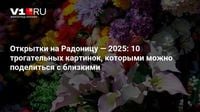As Orthodox Christians prepare to observe Radonitsa on April 29, 2025, a significant day dedicated to the remembrance of the deceased, communities across Russia reflect on the deep spiritual and cultural roots of this poignant holiday. Celebrated on the ninth day after Easter, Radonitsa, also known as Parent's Day, serves as a time for families to honor their loved ones who have passed away, believing that they remain close and continue their journey in eternal life.
The name Radonitsa derives from ancient Slavic words "род" (rod) meaning "kin" and "радость" (radost) meaning "joy," symbolizing a joyful remembrance of those who have left this earthly life but continue to live in the hearts and prayers of the living. Unlike days of mourning, Radonitsa is characterized by a spirit of joyful commemoration, as the church teaches that death is not an end but a transition to a different, eternal realm.
On this day, it is customary for believers to visit the graves of their relatives, tidying them up and adorning them with flowers, as a sign of respect and love. Many families also leave Easter symbols, such as decorated eggs and kulichi (Easter cakes), at the graves. These offerings serve as reminders of Christ's resurrection and the victory of life over death.
At home or in cemeteries, families often prepare a modest memorial meal, featuring traditional dishes like kutya (a sweet grain dish), pancakes, and kissel (a fruit dessert), along with the favorite foods of the departed. Part of the meal may be shared with those in need or taken to the church for memorial services. In many regions, there is a tradition of leaving a glass of water and a piece of bread on the grave, symbolizing hospitality and remembrance.
Churches hold requiem liturgies and panikhidas (memorial services) on Radonitsa, where believers submit notes with the names of the deceased, requesting a forty-day commemoration. Bringing food items such as bread, wine, and fruits to the church is also considered a good deed in memory of the departed. In some areas, it is believed that on Radonitsa, the souls of the deceased return to the world of the living to be with their families.
In the modern world, where the pace of life often leaves little room for deep reflection, Radonitsa remains a rare opportunity to pause and consider eternal values. It is a time to think about one's roots, pray for the souls of those who gave us life and love, and acknowledge that love transcends death. The holiday serves as a reminder that the memory of loved ones lives on as long as prayers and good deeds are performed in their honor.
While Radonitsa is a day of remembrance, there are several practices that are discouraged. The church advises against sadness and tears, emphasizing that this is a day of joyful memory rather than sorrow. It also discourages disputes and conflicts, as any animosity on this day is seen as particularly disrespectful to the memory of the deceased. Additionally, drinking alcohol in cemeteries is strictly prohibited, as the church does not condone drunkenness, especially in sacred spaces.
The origins of Radonitsa can be traced back to pagan traditions in ancient Rus’, where certain days were believed to allow communication between the living and the dead. The holiday has evolved over centuries, maintaining its core purpose of honoring the deceased while adapting to the Christian faith. Although some practices, such as holding elaborate feasts near graves, have fallen out of favor with the church, the essence of Radonitsa remains intact.
As families prepare for this year's observance, many are sharing their memories through postcards and images that capture the spirit of the holiday. Various media outlets, such as Sib.fm and FTimes.ru, have compiled collections of postcards for Radonitsa, allowing people to express their sentiments and share them with loved ones.
In conclusion, Radonitsa on April 29, 2025, will be a day filled with love, remembrance, and community. It is a time for families to gather, share stories, and celebrate the lives of those who have passed, reinforcing the belief that while the body may perish, the spirit lives on. As believers come together in prayer and remembrance, they find comfort in the thought that their loved ones are watching over them, guiding them on their journey through life.


